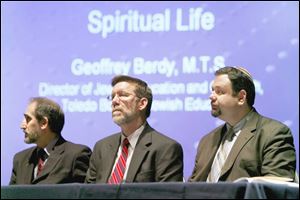
3 faiths find common ground in holy books
11/18/2006
Mashhad Al-Allaf, left, a Muslim, Richard Gaillardetz, a Christian, and Geoff Berdy, a Jew, were speakers for an interfaith lecture at the University of Toledo.
A trio of speakers representing the Jewish, Muslim, and Christian faiths gave talks Thursday night on how their holy books provide guidance for making spirituality part of daily life.
Speaking to a diverse audience of about 250 in the University of Toledo s Doermann Theatre were Geoff Berdy, director of Jewish education and outreach for the Toledo Board of Jewish Education; Richard Gaillardetz, professor of Catholic Studies at UT, and Mashhad Al-Allaf, of UT s newly established Imam Khattab Endowed Chair of Islamic Studies.
Mr. Berdy opened the dialogue by saying the core of Jewish spirituality consists of God, the Torah, and Israel. The word Torah can convey different meanings depending on the context, Mr. Berdy said, but always refers to the Scriptures and sometimes includes the oral tradition or accumulated religious knowledge of the Jewish people.
A graduate of Michigan State University and Harvard Divinity School, Mr. Berdy said that as a youngster he once asked an instructor what heaven was like and was told that it was studying the Torah all day.
That kind of depressed me, Mr. Berdy joked.
But he has come to realize that God is actually present in the world through the Word and that studying the Torah is the primary path to spiritual refinement and the soul of life.
Mr. Gaillardetz centered his talk on how the Lord s Prayer, found in the Gospels of Luke and Matthew, affirms four commonalities of the three Abrahamic faiths: the sovereignty and holiness of God, the importance of aligning oneself with God s will, the need for righteous living, and the priority of forgiveness.
The Gospels set high ideals that Christians do not always meet, he said, but when they are embodied, we feel we are witnessing a modern-day miracle.
I am thinking now of the moving example we were given recently of the Amish community in Nickel Mines, Pa., that suffered the murder of five young girls in the local schoolhouse by a deranged man who later took his own life, Mr. Gaillardetz said. This community immediately expressed its forgiveness of the man and one family invited the killer s widow to attend the funeral of their daughter.
He said the Lord s Prayer, or Our Father, compels us to live our lives in service of the coming reign of God.
Mr. Al-Allaf, who joined the UT faculty this semester, said there is always some religious intent when humanity speaks of wisdom, and Islam provides the structure for which Muslims to acquire that wisdom.
The Qur an states that God created Adam from clay, but Adam was not alive until God breathed into him, showing that human beings are more than mere matter, Mr. Al-Allaf said.
He explained that the Arabic word fitra means that humans have an intuitive ability to know God. The Prophet Muhammad said we are all born with fitra, but our parents make us Jew or Christian or Magian, Mr. Al-Allaf said.
Muslims are commanded to pray five times a day because it reminds them of our very short time on Earth, and it makes them aware that time is the capital of every human being, he said.
And Allah does not want people to be so spiritual that they withdraw from society, but rather to be mindful daily, weekly, monthly, and yearly of their spiritual essence in daily life.
After the three lecturers finished their presentations they fielded questions from the audience. One person said that if the three faiths have so much in common, Why are we in the mess we re in?
There are things going on in daily life that religion should not be blamed for, Mr. Al-Allaf responded. They have nothing to do with religion, which is used and abused.
Mr. Gaillardetz echoed that statement, saying that religion is often manipulated for political purposes. While it can be used for ill, it also can be a positive force, he said, citing religious influences that helped end Apartheid in South Africa.
The interfaith lecture program began in 2000 as the Muslim-Catholic Dialogue and in 2004 was expanded to the Jewish, Christian, and Muslim Perspective.